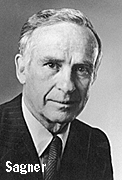

Democrat wins chairmanship of CPB Board
 Alan
Sagner, a New Jersey real estate developer active in Democratic politics,
was elected chairman of the CPB Board on Sept. 17 [1996], as appointees of
his party began to assert control during President Clinton's fourth year in
office.
Alan
Sagner, a New Jersey real estate developer active in Democratic politics,
was elected chairman of the CPB Board on Sept. 17 [1996], as appointees of
his party began to assert control during President Clinton's fourth year in
office.
Vice chairman is Diane Blair, an Arkansas political science professor, friend of the Clintons and Clinton-Gore campaign staffer.
It was not immediately apparent whether the change of board leadership would threaten the position of CPB President Richard Carlson, a Republican whose 1995-97 contract renewal reportedly was confirmed by a single vote's margin in May 1995. Sagner declined to discuss the matter in an interview.
After a long period of Republican majorities on the board, there are now equal numbers of directors from the two major parties. On Aug. 30, Clinton approved a recess appointment of Heidi Schulman, a freelance broadcast journalist and wife of Commerce Secretary Mickey Kantor. (The appointment, made during a congressional recess, will last through December 1997, and longer if the Senate confirms it.)
Nine directors are nominated by the President and confirmed by the Senate for six-year terms. No more than five can come from one party. Members with expired terms serve until replaced or, at longest, until the end of December 1996.
| Democrats | Term ends |
| Diane D. Blair, vice chair | Jan. 31, 1998 |
| Frank H. Cruz | Jan. 31, 2000 |
| Alan Sagner, chair | Jan. 31, 1998 |
| Heidi Schulman | Dec. 31, 1997 |
| Republicans | |
| Honey Alexander | March 26, 1996 |
| Ritajean H. Butterworth | Jan. 31, 1998 |
| Carolyn R. Bacon | March 26, 1996 |
| Sheila Tate | March 26, 1996 |
| Independent | |
| Henry J. Cauthen | Jan. 31, 2000 |
If Clinton keeps the presidency next year, the law would permit him to raise the number of Democrats on the nine-person board from four to five and appoint two non-Democrats, though a Republican-controlled Senate, which would have to consent, could thwart those nominations. Sagner's nomination languished in the Senate for five months in 1994.
Sagner and Blair were elected without opposition, though Ritajean Butterworth, his predecessor as chairman, abstained from the vote, and former chair Sheila Tate was absent.
Butterworth--a Republican and a longtime lay leader with Seattle stations and NPR--said before the board vote that she had wanted to run for reelection, but withdrew when she realized she "did not have adequate board support."
The board "should remain bipartisan," she told Current after the meeting. "Mr. Sanger himself told me that the leadership of the board should be the same party as the president. I happen to feel that it shouldn't be that way."
Her view was shared by Sen. Alphonse D'Amato (R-N.Y.), who two days before the vote wrote to Senate Commerce Committee Chairman Larry Pressler that Sagner would "unduly politicize the board," according to the Washington Times.
In an editorial on the morning of the vote, the conservative Times warned that Sagner's election as chairman "will surely be excellent ammunition in the pockets of the Republicans."
The Times not only quoted D'Amato questioning Sagner's qualifications for the office, but also highlighted Sagner's involvement in organizations far to the left of the newspaper. Sagner, the editorial pointed out, was not only "a part owner of the radical Nation magazine," but also a founder of the Fair Play for Cuba Committee, "a Trotskyite organization formed in the early '60s in order to support Fidel Castro's revolution," which later had Lee Harvey Oswald as a member.
Sagner, who wore a Clinton campaign pin to the board meeting, defended his record, noting that D'Amato and the newspaper omitted mention of his long service in public offices, including chairmanship of the New York-New Jersey Port Authority, 1977-85. Sagner acknowledged that he is a major investor in The Nation, though not an owner of it. He said the editorial's assertion that he had supported Castro's takeover of Cuba was "absolutely false."
Sagner said he was involved in the Fair Play for Cuba Committee for "about a year" in 1959-60 and resigned after the Soviet Union became more involved in Castro's movement, well before Oswald joined the committee. "My position then and now," he said, "is that small countries should be allowed to develop their own political institutions."
Both Sagner and Butterworth said that frictions on the board in recent years had little to do with the outcome of decisions affecting public broadcasting. "Any disagreements among members of the board had very little to do about the objectives of CPB," Sagner said.
During the board meeting, one Republican director alluded to the speculations that CPB would be politicized. In nominating Blair as vice chairman, Carolyn Bacon noted that Blair's motive "is not political--it's to do what's best for public broadcasting."
Bacon and Sagner recognized Butterworth for her work during her year as chairman. Carlson praised her as "a woman of great energy," decisiveness and directness, who "speaks out of only one side of her mouth."
Web page originally posted Nov. 14, 1996
Current: the newspaper about public TV and radio
in the United States
Current Publishing Committee, Takoma Park, Md.